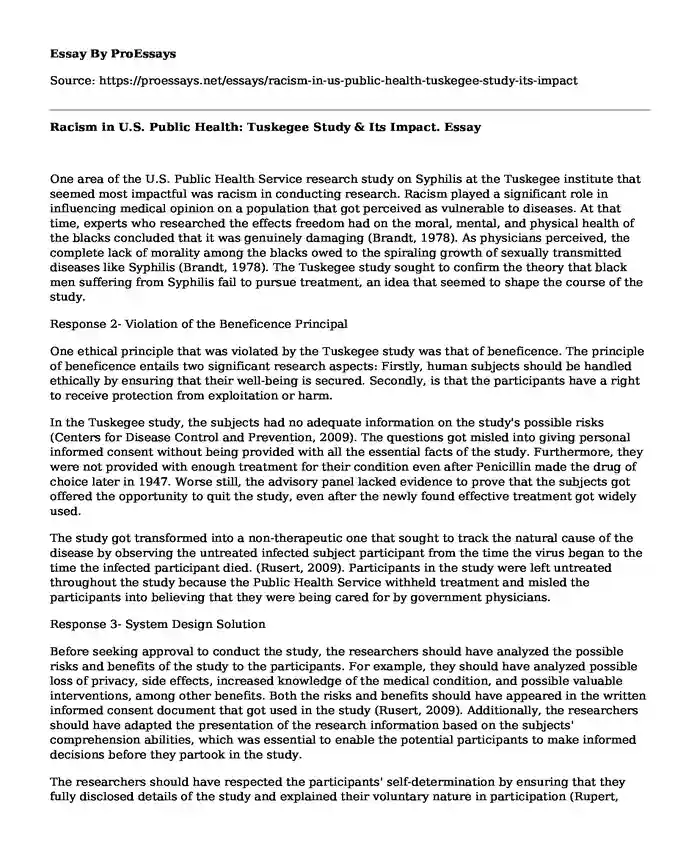One area of the U.S. Public Health Service research study on Syphilis at the Tuskegee institute that seemed most impactful was racism in conducting research. Racism played a significant role in influencing medical opinion on a population that got perceived as vulnerable to diseases. At that time, experts who researched the effects freedom had on the moral, mental, and physical health of the blacks concluded that it was genuinely damaging (Brandt, 1978). As physicians perceived, the complete lack of morality among the blacks owed to the spiraling growth of sexually transmitted diseases like Syphilis (Brandt, 1978). The Tuskegee study sought to confirm the theory that black men suffering from Syphilis fail to pursue treatment, an idea that seemed to shape the course of the study.
Response 2- Violation of the Beneficence Principal
One ethical principle that was violated by the Tuskegee study was that of beneficence. The principle of beneficence entails two significant research aspects: Firstly, human subjects should be handled ethically by ensuring that their well-being is secured. Secondly, is that the participants have a right to receive protection from exploitation or harm.
In the Tuskegee study, the subjects had no adequate information on the study's possible risks (Centers for Disease Control and Prevention, 2009). The questions got misled into giving personal informed consent without being provided with all the essential facts of the study. Furthermore, they were not provided with enough treatment for their condition even after Penicillin made the drug of choice later in 1947. Worse still, the advisory panel lacked evidence to prove that the subjects got offered the opportunity to quit the study, even after the newly found effective treatment got widely used.
The study got transformed into a non-therapeutic one that sought to track the natural cause of the disease by observing the untreated infected subject participant from the time the virus began to the time the infected participant died. (Rusert, 2009). Participants in the study were left untreated throughout the study because the Public Health Service withheld treatment and misled the participants into believing that they were being cared for by government physicians.
Response 3- System Design Solution
Before seeking approval to conduct the study, the researchers should have analyzed the possible risks and benefits of the study to the participants. For example, they should have analyzed possible loss of privacy, side effects, increased knowledge of the medical condition, and possible valuable interventions, among other benefits. Both the risks and benefits should have appeared in the written informed consent document that got used in the study (Rusert, 2009). Additionally, the researchers should have adapted the presentation of the research information based on the subjects' comprehension abilities, which was essential to enable the potential participants to make informed decisions before they partook in the study.
The researchers should have respected the participants' self-determination by ensuring that they fully disclosed details of the study and explained their voluntary nature in participation (Rupert, 2009). They should have reviewed the possibility of using rewards since some incentives or rewards may pressure potential participants to take part in a study, hence stripping away their full self-determination.
Fairness should have gotten exercised in selecting participants, which means that the researchers should not have selected participants from a population that they deemed undesirable or inferior for risky research. Also, social justice should have gotten applied to ensure there was an order of preference in selecting participants.
References
Brandt, A. M. (1978). Racism and research: the case of the Tuskegee Syphilis Study. Hastings center report, 21-29. DOI: 10.2307/3561468. Retrieved from https://www.jstor.org/stable/3561468Centers for Disease Control and Prevention. (2009). The Tuskegee Timeline. US Public Health Service Syphilis Study at Tuskegee. Retrieved from https://www.cdc.gov/tuskegee/timeline.htmRusert, B. (2009). "A study in nature": The Tuskegee experiments and the new south plantation. Journal of Medical Humanities, 30(3), 155-171. http://dx.doi.org/10.1007/s10912-009-9086-4
Cite this page
Racism in U.S. Public Health: Tuskegee Study & Its Impact.. (2023, Nov 15). Retrieved from https://proessays.net/essays/racism-in-us-public-health-tuskegee-study-its-impact
If you are the original author of this essay and no longer wish to have it published on the ProEssays website, please click below to request its removal:
- Research Paper on Rubella
- Global Perspectives on Advanced Practicing Nurse Paper Example
- Power and the Image of Nursing Essay Example
- Unconscious Patients: ABCCS Assessment and Immediate Care - Essay Sample
- Essay Sample on Case Study: A Common Technique in Nursing Practice
- Essay Sample on School-Based Programs: Reducing Tooth Decay in Kids
- Essay Example on Creating a Cost Effective Eye Program: Analyzing the Benefits & Challenges







